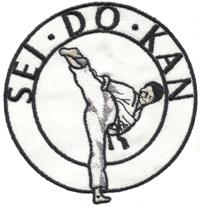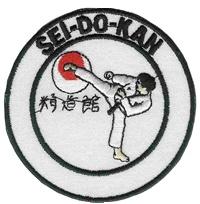
Sei-Do-Kan
Shotokan Karate Club


Frequently Asked Questions |
| Click a question for the answer |
|
|
Karate is a system of self defence and physical culture originally developed and refined in Okinawa and Japan. The word is formed from the Japanese words Kara (meaning empty) and Te (meaning hand), symbolising that its practitioners - known as Karateka - are unarmed, but use hands, arms, legs, and feet as striking weapons. There are several fundamental styles of Karate which all conform to the above definition, but use slightly different training methods and place varying degrees of emphasis on issues such as the speed, strength, and range of techniques - thus you will hear some described as 'fast' styles, and others as 'strong'. Shotokan is a style of Karate which emphasises a balanced development of all these aspects, taught within a system which instils confidence and self-control. The Shotokan style was originated by an Okinawan teacher of physical education, Funakoshi Gichin, who introduced it to Japan in 1922, where it was developed extensively by the Japanese Master, Masatoshi Nakayama. because of this development there have been relatively few changes since then, and Shotokan has spread to become the most widely practiced style of Karate throughout the world. Karate can be practiced by men, women, and children. Our students range from the very young to senior citizens. Anyone who is in reasonable health can train at Karate. Karate students will improve their self-awareness, self-confidence, and self-esteem, as well as their fitness. Parents and teachers continually report on the improvement in the behaviour of children who train regularly at KUGB clubs. This is because of the emphasis we place upon good manners and discipline. KUGB clubs are under the instruction of qualified Black Belts who are provided with the opportunity to attend specialist courses designed to improve their instruction skills in areas such as first-aid, club administration, coaching (for all levels and ages), nutrition, anatomy, and flexibility. Standards are maintained by the KUGB Technical Committee whose members range from 6th to 8th Dan. Your training will be structured into three main sections - Kihon, Kata, and Kumite - basic techniques, set combinations of techniques, and sparring. Each section has a range of complexity to suit the different levels of grades of students. Kumite will be introduced to you as basic blocking and counter-attacking, but will ultimately lead you to free-style fighting, where you will be taught to attack with, and defend against, unannounced attacks. Will I Be Able to Take Part in Competitions? Karate is an exciting and challenging sport. The KUGB has competed internationally since 1968, and has achieved numerous European and World team and individual titles. There are club and regional events for all ages and grades, with opportunities for selection to the Regional, English, Scottish, Welsh, and British Squads. There is also a separate championships (in November) for students in full-time higher-education at colleges and universities. What Benefits Are There in Practicing Karate? The hard physical training required to reach a high-level of skill in Karate promote overall good health, fitness, and well-being. The concentration, commitment and dedication required, help build a strong, confident, and determined character. There is a 'Dojo Kun', or training code, which not only ensures a disciplined training environment, but serves as a tool for moulding behaviour, so that a true Karateka will fight with words and only employ physical violence as a last resort, with obvious benefits to society. KUGB students are entitled to take grading examinations after set periods of training. These gradings are conducted by senior examiners, and there is a grading syllabus for all levels. Coloured belts are used to denote grades. There are 9 grades, known as Kyus, below black belt, with 9th Kyu, orange belt, being the lowest grade. Belt colours vary from club to club but the colours that the Sei Do Kan Club use are as follows :- Beginners wear white belts, followed by orange, red, yellow, green, purple, purple with one white stripe, brown, brown with one white stripe, and brown with two white stripes. There 10 levels of black belt, or Dan grades, with 1st Dan being the lowest. How Long Will It Take Me To Achieve My Black Belt? It is possible for a student to achieve their 1st Dan in 3 to 4 years, with regular and correct training. A student must then wait at least two more years before trying to achieve their 2nd Dan, and (once they have that) then wait 3 more years until trying to achvieve their 3rd Dan (and so on); so a 5th Dan will have at least 20 years of experience and dedication. Karate is a reasonably inexpensive pursuit. The KUGB club fees are low compared to many other sports and hobbies. The main equipment needed is a white karate suit and a belt (which can be obtained from Sensei). |
|
For queries and information contact Billy or Kat Higgins Phone: 07751 146703 (Billy) or 07525 207687 (Kat) Email: billy.higgins@sei-do-kan-karate.co.uk kat.higgins@sei-do-kan-karate.co.uk |
 |
|
(For technical queries about this web site email andy.bolton@sei-do-kan-karate.co.uk) |



